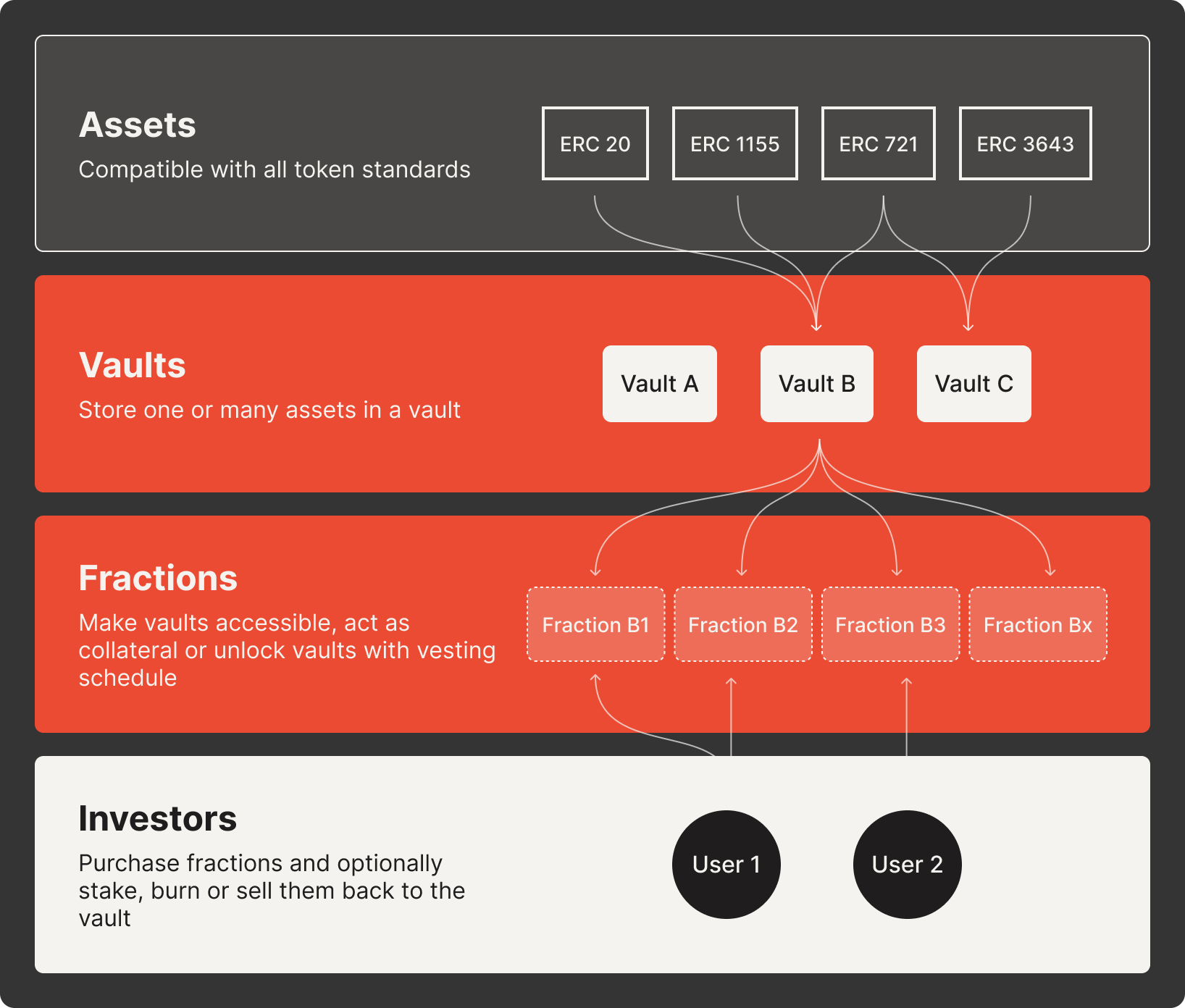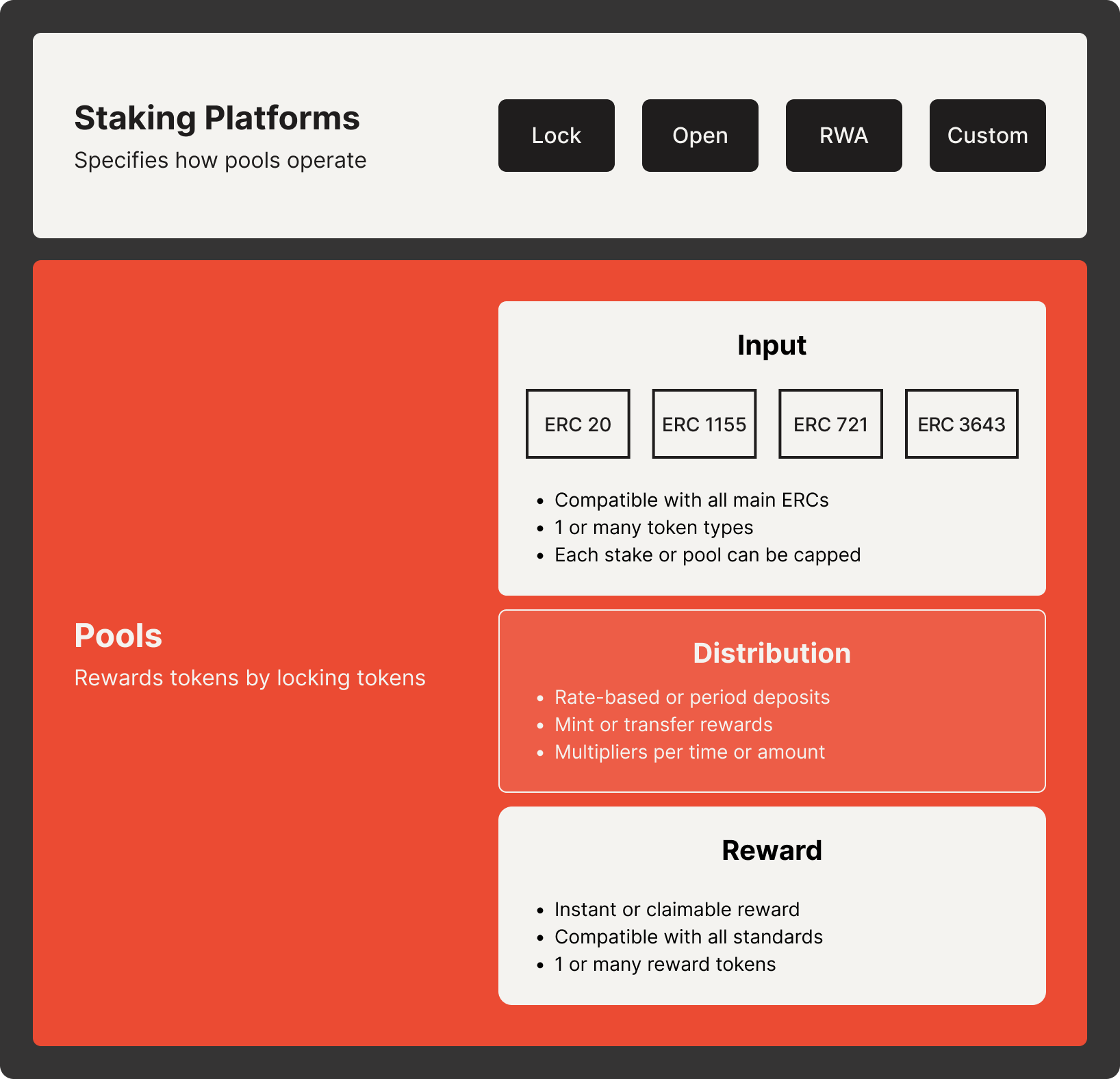Overview
Token Market Infrastucture
Evergon connects the worlds of Traditional Finance (TradFi) and blockchain by providing the essential market infrastructure for tokenization. Our goal is to offer a robust, compliant, and interoperable suite of tools that allows financial institutions, crypto companies, and asset issuers to create, manage, and distribute tokenized assets securely and efficiently.
Evergon's offering is built around three core products designed to work in synergy:
- Issuance Protocol: issue token contracts of majors standards (ERC-20, ERC-721, ERC-1155) gated by custom compliance rules.
- Fraction Protocol: wrap and fractionalize one or many tokenized assets and before distributing them at a specified or dynamic price point with or without vesting schedule.
- Staking Protocol: configure your custom staking pool in order to distribute rewards and yield to your token holders
Fraction protocol
The fraction protocol includes new primitives
- Vaults: These smart contracts wrap any token standard (e.g., ERC-20, ERC-721, ERC-1155), ensuring interoperability between different asset types. A Vault can hold collateral, distribute tokens according to predefined rules, or execute custom financial strategies.
- Fractions: These tokens represent fractional ownership of the assets locked within a Vault. They can be configured to unlock the underlying assets through vesting schedules or to act as proof of collateral in a financing arrangement.
- Omnichain: Native integration across multiple EVM-compatible blockchains, ensuring that Vaults, Fractions, and pools can operate seamlessly across different ecosystems.
The fraction protocol is compatible with legacy token standards to automate fractionalization, distribution and management of tokenized assets:
- Compatible with any asset class to issue shares.
- Distribute underlying asset with vesting schedules.
- Dynamic pricing for funds to sell at NAV price.
- Manage sales, recovery, liquidity and compliance.
- Invite and gate asset issuers and investors with your compliance rules.

Staking protocol
In the context of tokenized assets, staking is the process of locking up digital assets (such as ownership Fractions or other tokens) in a smart contract to receive rewards. These rewards can be in the form of yield, dividends, additional tokens, or other benefits.
The Evergon Staking Protocol is a decentralized staking pool factory. This unique design allows any user or company to create and deploy their own customized staking platforms and pools on demand. It eliminates the significant time and resources required to develop, audit, and maintain a staking system from scratch. This enables companies to launch campaigns to quickly:
- Distribute payments or dividends to RWA token holders.
- Reward community members who hold a specific NFT (art, social media, music, etc.).
- Grant a reputation score to holders of an ecosystem or utility token.
- Incentivize liquidity by rewarding Liquidity Providers (LPs) from automated market maker (AMM) protocols.

Core Infrastructure Features
Role Management
Market creators can deploy open or closed markets gated by roles. For instance, an issuer role may be required to tokenize an asset and create a sale, while an investor role may be required to stake in a pool or purchase a fraction. Role management is flexible and can be customized to the specific needs of each market.
Custom Compliance
Compliance is a critical component for bridging TradFi and blockchain. Both staking pools and vault fractions can enforce custom compliance rules through smart contract gating functionalities. This allows issuers to define and automate adherence to specific regulatory requirements, such as KYC/AML verification, investor accreditation, and jurisdictional restrictions.
Wallets & Custodianship
TMI offers custodianship and wallet solutions to facilitate a familiar Web2 experience for both issuers and investors. This includes compatibility with major self-custody wallets (MetaMask, TrustWallet, etc.), email-based wallets, account abstraction (EIP-4337), and institutional-grade custodian solutions (Ledger Enterprise, Taurus, Copper, etc.).
Nexera Standard
The TMI leverages the ERC-7208 On-chain Adapters, also known as the Nexera Standard. This standard provides a modular and extensible framework for token functionalities, ensuring future-proof adaptability and integration capabilities.
Updated 3 months ago
